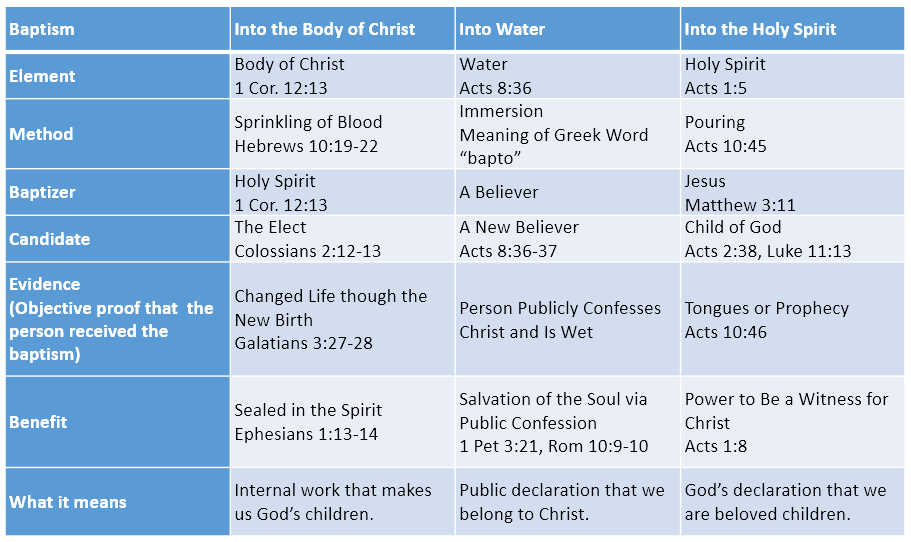
The baptism in the Spirit is a second experience with the Holy Spirit which can take place concurrent with the new birth, but usually afterward. The Spirit comes to indwell every person who is born again to impart Christ’s life, provide an interior witness that we are God’s children, provide guidance, and to teach us the meaning of God’s Word. The Holy Spirit is poured out on believers in the baptism in the Spirit to empower and equip us for service to God, especially to be his witnesses.
Now that we have introduced the baptism in the Holy Spirit, and defined it, let’s try to answer a very important question: is the baptism in the Spirit included as part of the new birth and received automatically at the time of justification or is it a separate experience with a different purpose?
With, In, or Upon?
The Bible teaches that the Holy Spirit can be with, in, or upon us. In the Old Testament, the Spirit was said to be “with” God’s people. He came alongside them to encourage, strengthen, equip, and generally help them. King David illustrates God being with his people in the following verse.
Even though I walk through the valley of the shadow of death, I will fear no evil, for you are with me…Psalm 23:4 (ESV)
But in the New Covenant, the Holy Spirit lives inside those who believe. Jesus promised his disciples:
And I will ask the Father, and he will give you another Helper, to be with you forever, 17 even the Spirit of truth, whom the world cannot receive, because it neither sees him nor knows him. You know him, for he dwells with you and will be in you. John 14:16-17 (ESV)
One of the big secrets of the Christian life is that the Spirit lives Christ’s life in and through us.
After forgiving our sins, Jesus did not leave us on our own. When a person is born again, the Holy Spirit takes up residence in that person. Our human spirit is joined to God’s Spirit and becomes one with him, a remarkable and wonderful mystery.
But the one who joins himself to the Lord is one spirit with Him. 1 Corinthians 6:17 (NASB)
The Spirit of God within us gives us life and develops within us peace and the character of God (the fruit of the Spirit). He affirms that we are indeed Abba Father’s children.
The Spirit Himself testifies with our spirit that we are children of God, Romans 8:16 (NASB)
But here is a very important point! Every born-again person is one with the indwelling Spirit, but not every child of God is baptized in the Holy Spirit.
If your experience resembles mine, it might be difficult to imagine that you did not receive it “all” when you were born again. My new birth experience was amazing, as was my ongoing relationship with God afterward. When I first started reading and hearing about people who said they were baptized in the Spirit, my first response was, “I don’t need that. I already received everything.” This is a common reaction that reveals two things. First, we tend to mold our theology around our experience rather than asking God to conform our experience to his Word. Secondly, we don’t like to admit that we lack something. But I, as you are most likely, was hungry for more of God.
Herein lies a danger: if we convince ourselves that we already have something, we may stop seeking it and never find it.
Sadly, just such thinking will send many to hell, who have convinced themselves that they already have everything they need from God, despite never having been born again. Thankfully I kept pursuing the baptism in the Spirit and eventually received it by faith with the evidence of speaking in tongues, which opened the door into a new dimension of serving our Lord. This can happen to you, too, if you have an open mind and a hungry heart.
The baptism in the Spirit is when the Holy Spirit comes “upon” us to equip and empower us for ministry.
Jesus received this baptism at the inauguration of his public ministry. If he needed it, how much more do we!
Then Jesus *arrived from Galilee at the Jordan coming to John, to be baptized by him. 14 But John tried to prevent Him, saying, "I have need to be baptized by You, and do You come to me?" 15 But Jesus answering said to him, "Permit it at this time; for in this way it is fitting for us to fulfill all righteousness." Then he *permitted Him. 16 After being baptized, Jesus came up immediately from the water; and behold, the heavens were opened, and he saw the Spirit of God descending as a dove and lighting on Him, 17 and behold, a voice out of the heavens said, "This is My beloved Son, in whom I am well-pleased." Matthew 3:13-17 (NASB)
Later, after being tempted by the devil in the wilderness for forty days, he went back to his hometown, full of the Spirit.
And He came to Nazareth, where He had been brought up; and as was His custom, He entered the synagogue on the Sabbath, and stood up to read. 17 And the book of the prophet Isaiah was handed to Him. And He opened the book and found the place where it was written, 18 "THE SPIRIT OF THE LORD IS UPON ME, BECAUSE HE ANOINTED ME TO PREACH THE GOSPEL TO THE POOR. HE HAS SENT ME TO PROCLAIM RELEASE TO THE CAPTIVES, AND RECOVERY OF SIGHT TO THE BLIND, TO SET FREE THOSE WHO ARE OPPRESSED, 19 TO PROCLAIM THE FAVORABLE YEAR OF THE LORD." 20 And He closed the book, gave it back to the attendant and sat down; and the eyes of all in the synagogue were fixed on Him. 21 And He began to say to them, "Today this Scripture has been fulfilled in your hearing." Luke 4:16-21 (NASB) Jesus clearly instructed his disciples not even to begin their Great Commission ministry until they received the same empowering.
But you will receive power when the Holy Spirit comes on you; and you will be my witnesses in Jerusalem, and in all Judea and Samaria, and to the ends of the earth." Acts 1:8 (NIV)
When God poured out his Holy Spirit on the Feast of Pentecost, it was to empower Christ’s followers to be bold witnesses to his resurrection. Today his people are baptized in the Spirit for the same purpose. And here lies a very important distinction between the indwelling Spirit and the outpoured Spirit.
The Spirit lives within us for our sake, but he is poured out upon us for the sake of others, many of whom do not yet know him.
The Record of Acts
All scripture is useful for doctrine.
What the early apostles believed is clearly seen by what they did.
All Scripture is inspired by God and is useful to teach us what is true and to make us realize what is wrong in our lives. It corrects us when we are wrong and teaches us to do what is right. 17 God uses it to prepare and equip his people to do every good work. 2 Timothy 3:16–17 (NLT) —
Acts is especially significant because there we see what the apostles believed lived out.
But someone will say, “You have faith and I have works.” Show me your faith apart from your works, and I will show you my faith by my works. James 2:18 (ESV)
Peter and Paul both understood that the new birth did not automatically include the baptism in the Spirit. In Acts Chapter Four, Peter and John made a trip to Samaria to lay hands on the new converts for them to receive the baptism in the Spirit.
Now when the apostles at Jerusalem heard that Samaria had received the word of God, they sent to them Peter and John, 15 who came down and prayed for them that they might receive the Holy Spirit, 16 for he had not yet fallen on any of them, but they had only been baptized in the name of the Lord Jesus. Acts 8:14-16 (ESV)
If the baptism in the Spirit had already taken place at the new birth, Peter and John would have simply taught the Samaritans this truth. However, they instead laid hands on them that they might receive the baptism of the Spirit.
Similarly, when Paul was in Ephesus, he encountered some followers of Christ, but he could tell that they had not yet received the baptism in the Spirit. What he asked them is revealing.
And he said to them, “Did you receive the Holy Spirit when you believed?” And they said, “No, we have not even heard that there is a Holy Spirit.” Acts 19:2 (ESV)
Paul was an apostle, who had the responsibility of laying a foundation of sound doctrine in the early church. (Ephesians 2:20) Surely, he understood whether or not the baptism in the Spirit is automatically received at the new birth! Of course, he did; so, when he asked them if they had received the Spirit when they believed, it shows us that the first does not necessarily include the second.
The Illustration of the Three Major Feasts

The three major feasts of Israel – Passover, Pentecost, and Tabernacles – also reveal that the new birth and the baptism in the Spirit are distinct.
Jesus fulfilled Passover to the day by being crucified as the Lamb of God and shedding his blood for the remission of sins. This feast also must be personally fulfilled in our lives through the new birth, if we are to be saved. The blood of God’s Lamb must be applied to our sins.
The Old Testament Feast of Pentecost, which originally marked the giving of the Law at Mt. Sinai, was also literally fulfilled to the day when God poured out his Spirit on the disciples in the upper room. Whereas the giving of the Law brought judgment, the giving of the Spirit gave life. Three thousand people died on Mt. Sinai for their rebellion, but 3000 came into the kingdom of God when Peter preached his first Gospel message on Pentecost. God also intends that each of us have a personal fulfillment of Pentecost as well, by receiving the baptism in the Spirit.
Just as Passover was a separate feast from Pentecost, the new birth is separate from the baptism in the Spirit.
Tabernacles, the final harvest, the last major feast, has yet to be fulfilled. I believe that Jesus will complete that feast at his Second Coming. Hallelujah!!! We will all need to have a personal fulfillment of that one, too, by participating in the resurrection of the dead. It is easy for us to see that one cannot be a child of God without having a personal Passover (new birth) and Feast of Tabernacles (resurrection from the dead). Should it not be just as clear to us that we must also have a personal fulfillment of Pentecost? It was to Peter and Paul.
Three Baptisms

The New Testament speaks of three distinct baptisms: into the body of Christ, into water, and into the Holy Spirit. Each of these baptisms has a different baptizer, a different medium, and different evidence, and a different result or purpose, which the chart above illustrates. I encourage you to study this to gain greater understanding.
 The baptism into the body of Christ is what happens when we are born again. The Holy Spirit plunges us into Christ, and we become one with him. The evidence is a changed life. Baptism into water by immersion is what another believer does to us, giving us an opportunity to publicly proclaim and acknowledge what God has already done in the Spirit and is our public declaration of allegiance to Jesus. The evidence is that we are wet. Jesus is the One who baptizes us into the Spirit by an outpouring to empower us to be bold witnesses. This outpouring may be likened to standing under a waterfall or a large bucket of water as in the picture above. We are effectively immersed, but its purpose is not identification. Instead, we have the Spirit upon us in power for ministry. The evidence of the baptism in the Spirit is speaking in tongues and prophecy. The Holy Spirit baptism is also God’s declaration to the world that we are his children.
The baptism into the body of Christ is what happens when we are born again. The Holy Spirit plunges us into Christ, and we become one with him. The evidence is a changed life. Baptism into water by immersion is what another believer does to us, giving us an opportunity to publicly proclaim and acknowledge what God has already done in the Spirit and is our public declaration of allegiance to Jesus. The evidence is that we are wet. Jesus is the One who baptizes us into the Spirit by an outpouring to empower us to be bold witnesses. This outpouring may be likened to standing under a waterfall or a large bucket of water as in the picture above. We are effectively immersed, but its purpose is not identification. Instead, we have the Spirit upon us in power for ministry. The evidence of the baptism in the Spirit is speaking in tongues and prophecy. The Holy Spirit baptism is also God’s declaration to the world that we are his children.
Questions for Further Study and Discussion
- Is there any part of the above teaching that needs further clarification?
- Do you agree that the baptism in the Spirit is distinct from the new birth and is for all disciples?
- Is there any reason you would not wish to receive this gift?
Want to know more? I have written a book on this very topic, which is available on Amazon. Click here to find out more.





 in this series illustrated how to conquer the strongholds of traditions of men and passivity. This article looks at how to get past a potentially severe blockage which can be erected in our lives due to past occult involvement. If you have ever been an occult practitioner of any sort, consulted such a person, or even dabbled in things you thought were harmless, such as a Ouija board, you should read this article and take the necessary steps to extricate yourself.
in this series illustrated how to conquer the strongholds of traditions of men and passivity. This article looks at how to get past a potentially severe blockage which can be erected in our lives due to past occult involvement. If you have ever been an occult practitioner of any sort, consulted such a person, or even dabbled in things you thought were harmless, such as a Ouija board, you should read this article and take the necessary steps to extricate yourself. anyone who takes the Bible seriously cannot afford to dismiss them. The Bible does not tell us much about their origin, but we do know that they are evil spirits which desire to inhabit human bodies and oppress anyone they can.
anyone who takes the Bible seriously cannot afford to dismiss them. The Bible does not tell us much about their origin, but we do know that they are evil spirits which desire to inhabit human bodies and oppress anyone they can.